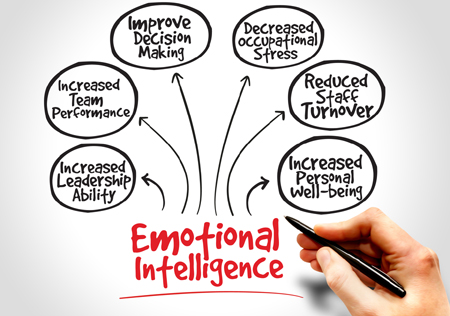Emotional Intelligence Definition Took Decades to be Formalized to Grasp Various Concepts, Still Some Spaces Left for More Studies
You may irritate while finding different psychologists detailing different emotional intelligence definitions. In fact psychologists have been trying to give a more comprehensive emotional intelligence definition by highlighting various aspects of Emotional Quotient (EQ). In other words none of the descriptions is wrong though they may vary in their content. However, we need to understand EQ since evolution of the IQ and then the development of concepts for the EQ.
History of IQ and Emotional Intelligence Definition
Emotional intelligence definition by different psychologists

In the 1900s, intelligence emphasized mainly on cognitive aspects such as problem-solving and memory skills. After this, several psychologists and researchers recognized that the intelligence of a human being can go beyond the traditional form of intelligence (IQ). In the decade of 1920, E.L. Thorndike included social intelligence concept within emotional intelligence, which rendered the skill of understanding and managing other people as well.
In 1983, Howard Gardner introduced this idea of multiple intelligence which incorporated several aspects like interpersonal intelligence, which is the capacity of understanding the desires, motivations, and understanding of different people and intrapersonal intellect which is the capability to understand your own self and appreciating your own feelings, motivations, and fears.
The first emotional intelligence definition can be attributed to The Study of the Emotion: Developing Emotional Intelligence from 1985 by Wayne Payne however, there are shreds of evidence that before this, the term was used by Leuner in 1966 in his studies. Following these researches, there have been made several studies by Stanley Greenspan in 1989, Salovey and Mayer in 1990, and Daniel Goleman in 1995. The difference between emotional intelligence as a personality trait and emotional intelligence as ability was introduced in year 2000.
At the basic level, emotional intelligence could be defined in these words
‘The ability to recognize and regulate feelings and emotions within ourselves as well as others ‘(Goleman, 2001)
The term ‘emotional intelligence’ was initially used by Peter Salovey and John Mayer in their published writing and defined emotional intelligence as,
“Emotional intelligence is a type of an ability which involves monitoring the feelings and emotions of our own selves and others, discriminating amongst them and making use of this information for guidance in actions and thoughts.’ (Salovey & Mayer, 1990)
After some time, these authors revised their definition of emotional intelligence and made it more widely accepted amongst psychologists and theorists. Now emotional intelligence is defined as,
“A person’s ability to perceive feelings and emotions, integrating these emotions for facilitating thoughts, understanding those emotions, and regulating them to promote personal growth.’ (Mayer and Salovey, 1997).
Alongside these researchers, another prominent psychologist who has made contributions in the field of emotional intelligence is Reuven Bar-On. This psychologist can be rendered as the originator as the term ‘emotional quotient.’ This aspect possesses a slightly different dimension and defines,
“Emotional intelligence involves being concerned with the understanding of the emotions of own self and others is also related to people along with adapting to and coping with immediate surroundings for being more successful in handling environmental demands.’ (Reuven Bar-On, 1997).
Kobe, Reiter-Palmon & Rickers (2001) refer emotional and social intelligence are overlapping concepts in which emotional intelligence has the tendency to influence both social and leadership abilities. Social intelligence can be explained as the ability to understand as well as manage other individuals who are considered to be essential for leadership roles. Social intelligence has also been validated as a separate construct of intelligence and serves to be a good predictor of leadership behavior (Bass, 1990).
Adding to the emotional intelligence definition, Reiff et al. (2001) investigated the relationship between emotional intelligence and learning disabilities amongst students. The study revealed that poor adaptability and stress management results in reduced abilities. This also indicated that there also exist gender differences in the relationship between emotional intelligence and learning disabilities.
In the late 1900s, Howard Gardner, Harvard-educated developmental psychologist proposed a revised theory of multiple intelligence in the emotional intelligence definition which dictates that humans possess aptitudes in different aspects like verbal, spatial, mathematical, musical, environmental, movement-oriented, intrapersonal which involves the evaluation of one own feeling, as well as interpersonal which, refers to the ability to understand intentions, desires, and moods of other people (Myers, 1998). Initially, these intelligence spheres were thought by Gardner to be an essential type of intelligence measurement (Gardner, 1983).
Recent Articles
-
What type of test did I take
Apr 04, 22 04:09 AM
I was given a psychological test years ago, but wasn’t told what it was for. The rating used a bell curve and my score fell in the above average not yet -
ﹰﹰﹰﹰﹰﹰﹰGOOD
Aug 13, 21 03:20 PM
Since the enneagram test helps people to understand their strength and weaknessess. And helps them remove their weaknesses then the test is good -
Knowing the inner me
Aug 13, 21 03:17 PM
Sometimes I ask myself that is this my behaviour or not? Because I am really shy and I lack confidence, I find it hard to socialize with other people.I
